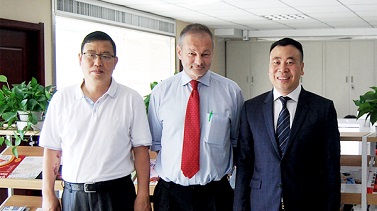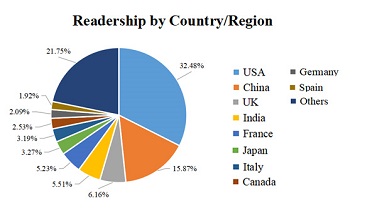Special Interview with Prof. Stephen Kingsmore
On June 25, 2025, Journal of Translational Genetics and Genomics (JTGG) had the pleasure of conducting an exclusive interview with Prof. Stephen Kingsmore, President and CEO of Rady Children's Institute for Genomic Medicine in San Diego, USA. Prof. Kingsmore is renowned for his pioneering work in rapid whole-genome sequencing (rWGS) for critically ill infants. In this insightful interview, Prof. Kingsmore shared his expertise on rWGS in newborns, the integration of artificial intelligence (AI) in genomics, key ethical and privacy considerations, and his personal journey in genetic research.
Below are highlights from the interview (Responses have been paraphrased and summarized for clarity and brevity):
Q1: You’ve led groundbreaking work in rapid whole-genome sequencing (rWGS). Could you share what motivates your continued focus on shortening the diagnostic journey for critically ill infants?
Answer: That’s an easy one. What motivates this continued focus is the ability to reduce suffering. We can ease the anxiety of parents, prevent delays in diagnosis, and reduce both morbidity and mortality in children. But we're not there yet. In the U.S., only 1-2% of critically ill infants who would benefit from rWGS currently receive it. And even among those who do, not all fully benefit—either because the test is ordered too late, or the results arrive too late. In theory, we could change outcomes for up to 400,000 critically ill infants per year. Yet today, only two to three thousand actually receive those benefits.
Q2: Has your team started integrating AI tools into sequencing pipelines? Are there areas where machine learning has already made a clear difference?
Answer: Absolutely. We and others started to integrate AI tools into sequencing pipelines as early as 2005. This marks our 20th year doing so. Since the introduction of next-generation sequencing, it’s been impossible to interpret or analyze a genome without AI tools. Even before “artificial intelligence” became a buzzword, we were using such tools to analyze and interpret genomes. It’s foundational —without AI, the data are simply too vast and complex for the human brain to process. AI has fundamentally shaped our field. You can't just download a genome into a spreadsheet and make sense of it—let alone for thousands of children. And very soon, whole genome sequencing will be fully automated. Today, the most expensive part of sequencing is the human labor. Within the next couple of years, I expect that AI will enable us to scale and automate genome sequencing for entire populations and move it from research settings into mainstream medical practice. This shift will require more than diagnostic tools— it will demand ways of translating genome data into actionable information that physicians can easily understand and use.
Q3: With the popularization of newborn genetic screening, the public is increasingly concerned about privacy and ethical issues. How do you think we should balance medical benefits and ethical responsibilities in genomic screening for infants and young children?
Answer: That’s a tough one. Public perceptions have changed dramatically over the last five years, especially due to the COVID-19 pandemic. There’s now a growing skepticism toward science, medicine, and authority in general. People are questioning not only genome screening or newborn testing, but the entire practice of medicine. Even long-standing medical practices (for 50 years) are being re-examined in this era of distrust and change. So yes, we’ve always had to consider ethics and privacy, but those concerns have evolved significantly. Today, many people distrust physicians, governments, and institutions. This creates real barriers to innovation in medicine. It means we must rethink how we engage and educate the public. We can no longer just say, “Trust us, this is good science.” Instead, we must show—clearly and transparently—that what we’re doing is for the public good and carries benefits that far outweigh the risks. At least we have experience to draw on. We've been sequencing the genomes of infants since 2010—15 years now—so we have a deep understanding of what can go wrong and how to address privacy and ethical challenges. We’ve developed solutions. I feel confident about our processes, but I’m also overwhelmed by the current landscape. Even when rWGS is FDA-approved and reimbursed by insurers like Medicaid or Blue Cross Blue Shield, some parents still reject it—simply because they no longer trust the healthcare system.
Q4: Today, many young scientists and clinicians are entering the field of genomic medicine. Looking back, are there any memorable or even humorous moments from your early career that you’d like to share?
Answer: Yes, two moments in particular had a lasting impact on me. The first was when I was 17, a high school senior who had just been accepted into medical school. I won a scholarship from the Marks & Spencer department store to study at the Weizmann Institute in Israel. That was my first exposure to genetics research—I studied a mouse with an immune deficiency called Chediak-Higashi syndrome. That experience changed my life. I went from wanting to be a doctor to wanting to become a geneticist—right before starting med school. The second moment was at age 27. I had just gotten married and was vacationing in South Carolina. A friend of my father's inquired about my career goals and subsequently wrote to Duke on my behalf. A few weeks later, I flew overnight to North Carolina for a postdoc interview. The interview with the Chair of Medicine, Joe Greenfield, lasted about 30 seconds. He looked over my résumé, stared me in the eye for 15 seconds and said: “You’ll do.” That was it—no formal process, no references. I went on to do genetics research at Duke, and at age 34, I identified the gene responsible for Chediak-Higashi syndrome, the same condition I'd studied as a teenager.
Click the link for the full interview: JTGG Academic Talks
About Prof. Stephen Kingsmore

Prof. Stephen F. Kingsmore is President and CEO of Rady Children’s Institute for Genomic Medicine at Rady Children’s Hospital, San Diego, where he is leading the implementation of pediatric genomic/precision medicine at an unprecedented scale. Previously, he was the Dee Lyons/Missouri Endowed Chair in Genomic Medicine at the University of Missouri-Kansas City School of Medicine and Director of the Center for Pediatric Genomic Medicine at Children’s Mercy Hospital, Kansas City. He has also served as President and CEO of the National Center for Genome Resources (Santa Fe, NM), COO of Molecular Staging Inc., Vice President of Research at CuraGen Corporation, Founder of GatorGen, and Assistant Professor at the University of Florida’s School of Medicine.
Prof. Kingsmore received his MB, ChB, BAO, and DSc degrees from Queen’s University Belfast. He trained in clinical immunology in Northern Ireland, completed his internal medicine residency and fellowship at Duke University Medical Center, and is a fellow of the Royal College of Pathologists.
His accolades include MedScape’s Physician of the Year (2012), the Scripps Genomic Medicine Award (2013), and the ILCHUN Prize from the Korean Society for Biochemistry and Molecular Biology (2013). TIME magazine recognized his rapid genome diagnosis work as one of the top 10 medical breakthroughs of 2012. In March 2015, he set a new record by reducing sequencing time to just 26 hours—a feat recognized by Guinness World Records in April 2016 as the fastest genetic sequencing in the world.
Editor: Iris Chen
Language Editor: Catherine Yang
Production Editor: Ting Xu
Respectfully Submitted by the Editorial Office of Journal of Translational Genetics and Genomics











